Jay Chou
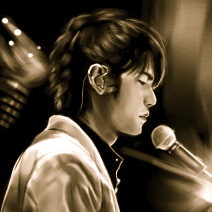
Jay Chou: I’m Not Worthy
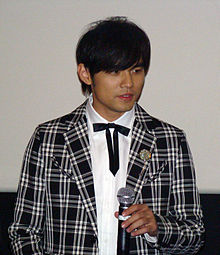 Chou at the premiere of Secret in Seoul, South Korea, January 2008
Chou at the premiere of Secret in Seoul, South Korea, January 2008
Jay Chou (born 18 January 1979) is a Taiwanese musician, singer-songwriter, multi-instrumentalist and actor. In 2000, Chou released his first album, titled Jay (2000), under the record company Alfa Music. Since then his music has gained recognition throughout Asia, most notably in regions such as Taiwan, Mainland China, Hong Kong, Singapore, Malaysia and in western Asian communities such as in the United States and Australia. He has sold more than 30 million albums since his debut. Chou continues to write songs for other artists, work on his album and went on to win numerous awards in the music industry. In 2003, he was the cover story of Time magazine (Asia version), acknowledging his influence on popular culture. He has since held five world tours, performing in cities around the world to more than 10 million people.
Chou debuted his acting career and made his film debut in Initial D (2005), and also since ventured into many movie projects. His first Hollywood debut is in the movie The Green Hornet, starring along with Seth Rogen and Cameron Diaz. Chou also manages his own record and management company JVR Music.
Early Life
 Jay Chou grew up in Linkou, Taipei County in Taiwan. Both his parents were secondary school teachers: his mother, Yeh Hui-Mei (simplified Chinese: 叶惠美; traditional Chinese: 葉惠美; pinyin: Yè Huìměi), taught fine arts, while his father, Chou Yao-Chung (Chinese: 周耀中; pinyin: Zhōu Yàozhōng), was a biomedical researcher. His mother noticed his sensitivity to music and took him to piano lessons at the age of four. During his childhood, he was fascinated with capturing sounds and songs with his tape recorder, which he carried everywhere with him. In the third grade, he became interested in music theory and also started cello lessons. He is an only child and loved to play piano, imitate TV actors, and perform magic tricks. His favorite composer was, and still is to this day, Chopin. His parents divorced when he was 13, which caused him to become reclusive and introverted. Although he had friends, he often preferred to be alone, listening to music, contemplating and daydreaming. At Tamkang Senior High School, he majored in piano and minored in cello. He showed talent for improvisation, became fond of pop music and began to write songs.
Jay Chou grew up in Linkou, Taipei County in Taiwan. Both his parents were secondary school teachers: his mother, Yeh Hui-Mei (simplified Chinese: 叶惠美; traditional Chinese: 葉惠美; pinyin: Yè Huìměi), taught fine arts, while his father, Chou Yao-Chung (Chinese: 周耀中; pinyin: Zhōu Yàozhōng), was a biomedical researcher. His mother noticed his sensitivity to music and took him to piano lessons at the age of four. During his childhood, he was fascinated with capturing sounds and songs with his tape recorder, which he carried everywhere with him. In the third grade, he became interested in music theory and also started cello lessons. He is an only child and loved to play piano, imitate TV actors, and perform magic tricks. His favorite composer was, and still is to this day, Chopin. His parents divorced when he was 13, which caused him to become reclusive and introverted. Although he had friends, he often preferred to be alone, listening to music, contemplating and daydreaming. At Tamkang Senior High School, he majored in piano and minored in cello. He showed talent for improvisation, became fond of pop music and began to write songs.
Chou graduated from high school with inadequate grades for university, so he prepared for mandatory military service. However, a sports injury triggered by an unexplainable and severe back pain eventually led to the diagnosis of ankylosing spondylitis, a hereditary spine inflammation disease; as a result, he was exempted from conscription. Meanwhile, he found himself a job as a waiter.
Early Career
 Chou’s mum initially aspired Chou to become a music teacher, while Chou remained relatively clueless on what to do with his life. Without his knowing, a friend of his had entered both their names in a talent show called Super New Talent King in 1998. Chou played the piano accompaniment for his friend, whose singing was described as “lousy”. Although they did not win, the show’s host Jacky Wu—an influential character in Taiwan’s entertainment business—happened to glance at the music score and was impressed with its complexity. Wu then asked who wrote it, discovered Chou and hired him as a contract composer and paired him with the novice lyricist Vincent Fang. For his then record company Alfa Music. Chou then spent most of his time in Wu’s studio learning music producing, sound mixing, recording and writing songs. Although he was trained in classical music, Chou combines Chinese and Western music styles to produce songs that fuse R&B, rock and pop genres. However Wu told Chou that he will help Chou to release an album after he wrote 100 songs and he will pick ten from there. Chou already had an arsenal of songs he wrote for others but had been rejected, so among those he chose 10 for his debut CD album Jay that was released in 2000. The album established his reputation as a musically gifted singer-songwriter whose style is a fusion of R&B, rap, classical music, and yet distinctly Chinese. His fame spread quickly in Chinese-speaking regions throughout Southeast Asia.
Chou’s mum initially aspired Chou to become a music teacher, while Chou remained relatively clueless on what to do with his life. Without his knowing, a friend of his had entered both their names in a talent show called Super New Talent King in 1998. Chou played the piano accompaniment for his friend, whose singing was described as “lousy”. Although they did not win, the show’s host Jacky Wu—an influential character in Taiwan’s entertainment business—happened to glance at the music score and was impressed with its complexity. Wu then asked who wrote it, discovered Chou and hired him as a contract composer and paired him with the novice lyricist Vincent Fang. For his then record company Alfa Music. Chou then spent most of his time in Wu’s studio learning music producing, sound mixing, recording and writing songs. Although he was trained in classical music, Chou combines Chinese and Western music styles to produce songs that fuse R&B, rock and pop genres. However Wu told Chou that he will help Chou to release an album after he wrote 100 songs and he will pick ten from there. Chou already had an arsenal of songs he wrote for others but had been rejected, so among those he chose 10 for his debut CD album Jay that was released in 2000. The album established his reputation as a musically gifted singer-songwriter whose style is a fusion of R&B, rap, classical music, and yet distinctly Chinese. His fame spread quickly in Chinese-speaking regions throughout Southeast Asia.
Music Career – 2000 to 2002
Jay Chou: In the Name of The Father
Another awesome Jay song! From the album Ye Hui Mei
Jay Chou launched his debut album “Jay” under Alfa Music in 2000. The album was promoted heavily by Jacky Wu in the entertainment shows he hosted. Jay also appeared in some of the shows himself. He frequently wears a cap and leave his head hanging low in the early days, which gives him a unique image and piques the curiosity of viewers. The debut album and Jay himself was marketed as a talented singer-composer album with a unique tune. With his collaboration with Vincent Fang and Vivian Hsu in the album, it also brought about a few hits.
After promoting the debut album shortly, Jay went into the studio for next 12 months to record and produce the next album “Fantasy”. This album released in September 2001 became a big hit and sold an estimated 2 million copies in Taiwan alone. Other than being a commercial success, the album also garnered Jay 5 awards out of being nominated 10 at the much-coveted 13th Golden Melody Awards in 2002. This established Jay in the music industry. Hits such as “簡單愛” (simple love) which brings out the simplicity of love in youth with a very catchy tune, “愛在西元前” which talks about love before B.C. won Chou the Best Composer award, and “開不了口” talks about a person leaving on a space mission while he didn’t get to profess his love to his loved one. All these songs are Chou’s signature songs and are being sung in concerts even till today.
Chou’s music became much-discussed topic because it is different from mainstream popular Chinese music at that time. It infuses themes of ancient past, futuristic space ship, and his music invokes very clear and vivid imagery to its listeners. A characteristic of his singing was also being brought up that with his rapping or singing, people often could not decipher what he is singing until they look at the lyrics. Chou says this is his signature style or infusing his singing with the music in the song to “make it blend” well together. Critics refer to his singing as “mumbling”. This garnered a lot of attention and reporters often quiz Chou on his singing style. Another reason Chou came up with is that he wants the listeners to look at the lyrics because the lyrics written by Vincent Fang are very deep. All these prompted many to start listening to Chou’s music in the music world. Up till this point in time, his music is mainly within the R&B genre. This album is to be looked back, the most significant part of his career which catapulted Jay into stardom.
Chou followed the formula that works for his third album, with songs that invoke imagery, collaborating with lyricist Vincent Fang, “mumbling” singing and mainly R&B tunes. His third album “Eighth Dimensions” is still a commercial success. With it, he held the world concert tour “The One.”
2003 to 2004
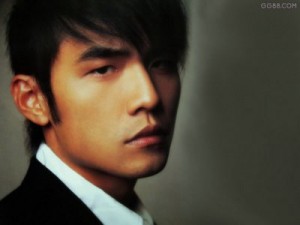 In 2003, Chou released his fourth album ‘Ye Hui Mei” named after his own mother. After the release of this album, he attended the Golden Melody Awards for his previous album’s nomination. The album “Eighth Dimension” was nominated for 5 categories but won none. Chou didn’t took this too lightly, as he wrote on his next album the song “外婆” that he actually takes the Golden Melody Awards too seriously. Ironically, his then-current album “Ye Hui Mei” will win a Golden Melody “Best Album of the year” award in 2004.
In 2003, Chou released his fourth album ‘Ye Hui Mei” named after his own mother. After the release of this album, he attended the Golden Melody Awards for his previous album’s nomination. The album “Eighth Dimension” was nominated for 5 categories but won none. Chou didn’t took this too lightly, as he wrote on his next album the song “外婆” that he actually takes the Golden Melody Awards too seriously. Ironically, his then-current album “Ye Hui Mei” will win a Golden Melody “Best Album of the year” award in 2004.
“Ye Hui Mei” was both a commercial and musical success. The album features songs on Mafia and drug lords “以父之名” which at first hearing was very unorthodox but it displays Jay’s creative writing and producing ability. This album can be seen as Jay’s second milestone because it gained extremely positive reaction from both critics of his music and supporters of his music. Jay also wanted to prove that he is a versatile artist and not only writes R&B songs, he ventured into more rock-flavoured tunes such as “晴天” which is one of the most played songs of the year. This song gained widespread popularity and high school students started learning guitar to play the drift of the song’s intro.
Musical Style – List of songs written and performed by Jay Chou
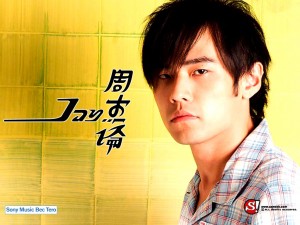 hou’s compositions are loosely categorized as pop music. While many of his works fall into contemporary R&B, rap, and rock genres, the term “Chou Style” (Chinese: 周氏風格; pinyin: zhōu shì fēnggé) has been popularized to describe his trademark cross-cultural music and his insistence on singing with slurred enunciation. Taipei Times once described the meaning of “Chou Style”: “In what has become the archetypal Chou style, Taiwan’s favorite son blends pop, rap, blues and a smorgasbord of esthetic elements of world music to create his dream-like never-never land …”
hou’s compositions are loosely categorized as pop music. While many of his works fall into contemporary R&B, rap, and rock genres, the term “Chou Style” (Chinese: 周氏風格; pinyin: zhōu shì fēnggé) has been popularized to describe his trademark cross-cultural music and his insistence on singing with slurred enunciation. Taipei Times once described the meaning of “Chou Style”: “In what has become the archetypal Chou style, Taiwan’s favorite son blends pop, rap, blues and a smorgasbord of esthetic elements of world music to create his dream-like never-never land …”
He regularly fuses traditional Chinese instruments and styles with R&B or rock to form a new genre called “Zhongguo feng” (simplified Chinese: 中国风; traditional Chinese: 中國風; pinyin: Zhōngguó fēng), which literally means “Chinese Style Music,” some of which are written in the Pentatonic Scale as opposed to the more common seven-note scale (Diatonic Scale) to accentuate an oriental style. Besides his own culture, he also incorporated Spanish guitar in “Red Imitation” (Chinese: 紅模仿; pinyin: hóng mófǎng), American techno/electronica in “Herbalist’s Manual” (Chinese: 本草綱目; pinyin: Běncǎo Gāngmù), rap with subtle classical music undertones in “Reverse Scales” (Chinese: 逆鱗; pinyin: nìlín), Blues style in “Free Tutorial Video” (Chinese: 免費教學錄影帶; pinyin: Mian Fei Jiao Xue Lu Ying Dai) and Bossanova style in “Rosemary” (Chinese: 迷迭香; pinyin: mídiéxiāng), to name a few. Sound effects from everyday life are frequently woven into his music, such as bouncing ping pong balls, touch tone phone dialing, helicopter blades, dripping rain, and radio static noise (Musique Concrète).
His formal musical training is evident by the use of classical textures in his compositions. For example, counterpoint was used in “Perfection” (Chinese: 完美主義; pinyin: wánměizhǔyì) and “Sorry” (Chinese: 對不起; pinyin: duìbuqǐ), while polyphony can be found in “The Wound That Ends War” (Chinese: 止戰之殤; pinyin: zhǐ zhàn zhī shāng) and “Twilight’s Chapter Seven” (Chinese: 夜的第七章; pinyin: yè de dì-qī zhāng).
Chou’s albums have been noted for the lack of change compared to his earlier works, yet he firmly stated that he will not alter his style: “They say I’ve been standing still … but this is the music I want, and I don’t see what I want by moving ahead.” To demonstrate his point, he named his 2006 album Still Fantasy after his 2001 album Fantasy. His use of relaxed enunciation has been criticized as “mumbling” which he also insisted will not change; however, recently he has adopted clearer pronunciation for certain songs, particularly more traditional Chinese style songs, such as “Faraway” (Chinese: 千里之外; pinyin: qiānlǐ zhīwài) which features Fei Yu-ching and “Chrysanthemum Terrace” (Chinese: 菊花台; pinyin: júhuā tái).
Lyrics
Chou is more often a singer-composer than a lyricist. Several “regulars” write the lyrics for most of his music, but the content and style is unified with his own personality and image, covering a diverse range of topics and ideas. Vincent Fang accounts for more than half of the lyrics in his albums, helping to establish an important element in Chou’s music: the use of meaningful, imagery- and emotionally rich lyrics, sometimes written in the form of ancient Chinese poetry with reference to Chinese history or folklore. In addition to writing romantic hits, he also touches on war, the Bible, sports, and martial arts. Vivian Hsu is a singer herself and has helped with Chou’s earlier hits, while Huang Jun Lang (Chinese: 黃俊郎; pinyin: Huáng Jùnláng) is noted for his work surrounding unusual themes (such as a detective story and chess game).
Chou himself has written lyrics for many ballads, but has also discussed societal ills such as drug addiction in “Coward” (Chinese:懦夫; pinyin: nuòfū) and loss of the rural countryside to urbanization in “Terrace fields” (Chinese: 梯田; pinyin: tītián). Domestic violence discussed in “Dad, I am back” (Chinese: 爸,我回來了; pinyin: bà, wǒ huílai le) received a great deal of commotion since he was the first to bring up this taboo subject in Sanscript music, which helped solidify his status as a pioneer and a unique pop singer capable of approaching serious issues. In the songs “Maternal grandmother” (Chinese: 外婆; pinyin: wàipó) and “Listen to Mother” (Chinese: 聽媽媽的話; pinyin: tīng māma de huà), he voiced his high regard for family values. He addressed personal issues about his failure to enter university in “Split” (Chinese: 分裂; pinyin: fēnliè), his resentment towards the paparazzi in “Besieged From All Sides” (Chinese: 四面楚歌; pinyin: sìmiànchǔgē), “Rice Fragrance” (Chinese: 稻香; pinyin: dào xiāng), a song from his 9th album Capricorn encourages people not to give up their dreams even when facing difficulties in life, the sadness of becoming a clown in “Uncle Joker”(Chinese: 喬克叔叔; pinyin: Qiao Ke Shu Shu) and highlighted the importance of individuality in “Popular Imitation” (Chinese: 紅模仿; pinyin: hóng mófǎng).
Chinese Cultural Elements
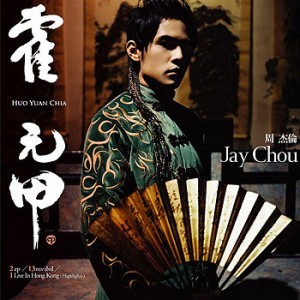 Chou leads a new trend of music which combines western musical elements and Chinese literature terms. Because of this unique combination, he makes distinction between himself and other musicians by leading a “China Wind” in Asian music history. The success of his Western-Chinese musical combination is built on his marketing strategies and the musical elements involved in his works.
Chou leads a new trend of music which combines western musical elements and Chinese literature terms. Because of this unique combination, he makes distinction between himself and other musicians by leading a “China Wind” in Asian music history. The success of his Western-Chinese musical combination is built on his marketing strategies and the musical elements involved in his works.
In early 21st century, the People’s Republic of China was in an economic transition model. The new generation was looking for a consumption pop culture which would reflect individual uniqueness in the social circumstance.
The traditional Chinese cultural elements involved in Chou’s music contribute to his status in Asian popular music culture. The blowing “China Wind” in his music leads a new trend of Chinese pop music which involves a vast amount of traditional Chinese components, rather than simply following Western music format. Chou’s China Wind is highlighted in his lyrics and the use of traditional musical instruments in his music. Lyricist Vincent Fang has worked with Jay Chou since 2000. Fang’s work is featured by addressing Chinese traditional elements, such as poetry and Confucianism. His representative work “Chrysanthemum Terrace” (Chinese:菊花台, pinyin: juhua tai), released in 2006, shows a vast amount of cultural elements. In this work, Fang puts images which indicate certain traditional ideas to build the an ancient monarchy setting. He uses chrysanthemum as a metaphor of love. In the line “Chrysanthemums broken, scattered across the floor, your smile has faded” (Chinese: 菊花残 满地烧 你的笑容已泛黄)).
Chou also uses traditional musical instruments, combining traditional Chinese elements of music with Western pop.
Collaborations
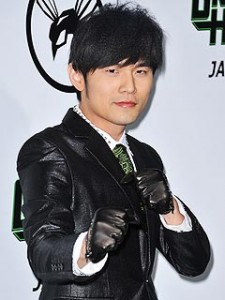 Chou began as a songwriter for other singers and continued this area of work even after he debuted his own career in singing. He has composed frequently for Jolin Tsai, Landy Wen, and occasionally for other Taiwanese singers such as Coco Lee, S.H.E, Vivian Hsu, Leehom Wang, Will Liu, Valen Hsu, and Hong Kong pop stars Edmond Leung, Gigi Leung, Jordan Chan, Edison Chen, Karen Mok, Leo Ku, Eason Chan, and Joey Yung, as well as a one-time collaboration with Howard Su. He has also written for singers outside of his generation—over one dozen songs for his mentor Jacky Wu, later also for Taiwanese singer Jody Chiang, and Hong Kong singers Jacky Cheung, Andy Lau, Aaron Kwok, and Kenny Bee.
Chou began as a songwriter for other singers and continued this area of work even after he debuted his own career in singing. He has composed frequently for Jolin Tsai, Landy Wen, and occasionally for other Taiwanese singers such as Coco Lee, S.H.E, Vivian Hsu, Leehom Wang, Will Liu, Valen Hsu, and Hong Kong pop stars Edmond Leung, Gigi Leung, Jordan Chan, Edison Chen, Karen Mok, Leo Ku, Eason Chan, and Joey Yung, as well as a one-time collaboration with Howard Su. He has also written for singers outside of his generation—over one dozen songs for his mentor Jacky Wu, later also for Taiwanese singer Jody Chiang, and Hong Kong singers Jacky Cheung, Andy Lau, Aaron Kwok, and Kenny Bee.
He initiated the band Nan Quan Mama in 2004, selecting band members and overseeing their album production. The group has been noted for sounding too similar to their mentor; as a result, Chou has reduced his involvement in the band, but continues to help increase their exposure to mass audiences by inviting them as guests performers for his own concerts and music videos.
He has performed live duets with Landy Wen, Jolin Tsai, and former girlfriend news anchor Patty Hou, but only two studio recordings of duets have been formally placed in his own albums: “Coral Sea” (Chinese: 珊瑚海; pinyin: shānhú hǎi) in 2005 with Lara Veronin (of Nan Quan Mama) and “Faraway” (Chinese: 千里之外; pinyin: qiānlǐ zhīwài) in 2006 features Fei Yu-Ching, who began his career in the 1970s.
Besides working with singers, Chou’s longest-running collaboration is with lyricist Vincent Fang, as they both started their careers in the music field in 1998. The compilation album Partners (Chinese: 拍檔; pinyin: pāi dàng) featured 12 songs, each consisting of Chou’s musical and Fang’s lyrical compositions. Fang has written the words to more than 40 of Chou’s songs, was the chief editor of Chou’s book Grandeur de D Major (Chinese: D調的華麗; pinyin: D diào de huálì), and is now Chou’s business partner (together with Chou’s manager JR Yang) for the record company JVR Music.
Jay Chou was also featured in Cindy Yen‘s (袁詠琳) song “Sand Painting” (畫沙) released in October 2009.
Jay Chou collaborated with Kobe Bryant on “The Heaven and Earth Challenge”(天地一鬥) in order to “promote youth creativity, as well as an upcoming slam-dunk competition in China.” The song was released at a press conference before the NBA All-Star Game on 20 February 2011.
World Tours
 Jay Chou’s 3D enhanced stage at his Singapore concert in 2010, as part of hisThe Era World Tour
Jay Chou’s 3D enhanced stage at his Singapore concert in 2010, as part of hisThe Era World Tour
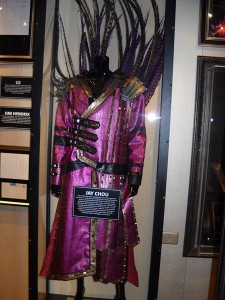 Chou’s 2007 tour outfit exhibited at the Hard Rock Cafe 40th anniversary tour in Seattle, 2011
Chou’s 2007 tour outfit exhibited at the Hard Rock Cafe 40th anniversary tour in Seattle, 2011
Jay held his first series of five solo concerts, titled Fantasy Concert (范特西演唱會), with the first stop on 11 January 2001 at Taoyuan Arena, Taiwan. Followed by two shows at the Hong Kong Coliseum, one in Malaysia and ended in Singapore on 10 February 2002. His second concert tour, The One Concert (The One 演唱會) commenced on 28 September 2002 at Taipei Municipal Stadium, followed by 11 stops and ended at Shenzhen Stadium, China on 3 January 2004.
Two more series of world tours followed: Incomparable Concert (無與倫比演唱會) in 2004 and Jay Chou 2007 World Tours (2007世界巡迴演唱會), with stops in cities such as Taipei, Tokyo, Hong Kong, Beijing, Kuala Lumpur, Singapore, Las Vegas, Toronto and Vancouver. In 2010, to celebrate Jay’s 10 year career in the entertainment industry, he embarked on his fifth series of concert tour titled, New Era World Tour (超時代演唱會), with the first stop of three concerts from 11 to 13 June 2010 at Taipei Arena, followed by 24 stops ending in Malaysia on 5 March 2011.
He has kicked off his World Tour, “Opus Jay World Tour” in 2013 starting with Shanghai as it’s first stop.
World tours/Live (DVD) Album Releases
- 2001 – Fantasy Concert (范特西演唱會)
- 2002 – The One Concert (The One 演唱會) – Jay Chou The One Concert Live
- 2004 – Incomparable Concert (無與倫比演唱會) – Incomparable Jay Concert Live
- 2007 – Jay Chou World Tours (世界巡迴演唱會) – Jay Chou 2007 the World Tours Concert Live
- 2010 – New Era World Tour (超時代演唱會) – Jay Chou 2010 The Era World Tours Concert Live
- 2013 – Opus Jay World Tour (魔天伦演唱會) – Jay Chou 2013 Opus Jay World Tours Concert Live
Movie Career
Chou formally entered the film industry in 2005 with the release of the movie Initial D (頭文字D). He has since acted in three other movies, directed one film and more than a dozen music videos. Chou, who once said “I live because of music,” ventured into movies because he felt the need for a new challenge. As fans have grown concerned that movies will compromise his music career, Chou has repeatedly reassured that movies are a source of inspiration and not a distraction; at the same time, he realizes the need to balance both careers and maintain his place in the music field to garner the continued support of fans.
Acting
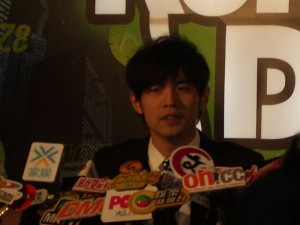 Jay Chou at a promotional event for Kung Fu Dunk in January 2008
Jay Chou at a promotional event for Kung Fu Dunk in January 2008
Entry into acting was an unexpected move for Chou. His high school English teacher thought he was capable of very few facial expressions, and the director of Hidden Track (2003, a movie in which Chou had a cameo role) said that his strong individualistic personality will not make him a good actor. In 2005, Chou’s first role as the lead actor in Initial D served two purposes: to launch his acting debut, and to increase his exposure to Japanese audiences. This film is based on the Japanese comic Initial D, where Chou played Takumi Fujiwara, a gifted touge racer who is quiet and rarely shows expression. Some reviewers criticized his bland acting while others felt he performed naturally, but only because the character’s personality closely mirrored his own. His performance in Initial D won him Best Newcomer Actor in Golden Horse Awards and Hong Kong Film Awards. Chou’s second film was Curse of the Golden Flower(2006). As a supporting character, he drew much of the attention of Chinese reporters; Chou’s involvement in this movie was announced in its own press conference, separate from the meeting held for Chow Yun-fat, Gong Li, and the other actors. Chou portrayed Prince Jai, the ambitious second eldest prince and general of the Imperial army whose personality epitomizes Xiao (孝), the Chinese virtue of filial piety. In this internationally released film, North American audiences saw Chou for the first time. According to Chinese movie critics, comments about his acting ranged from “lacks complexity” to “acceptable,” but was critically praised by Western reviewers. His performance in Curse of the Golden Flower was nominated Best Supporting Actor in the Hong Kong Film Awards. In the 2008 film Kung Fu Dunk, Chou portrayed a kung fu student and dunking prodigy, and the film earned over¥100 million (US$14.7 million).
Chou portrayed Kato in The Green Hornet, directed by Michel Gondry and released in January 2011, after Hong Kong actor Stephen Chow withdrew from the project; the film grossed over $228 million worldwide. MTV Networks‘ NextMovie.com named him one of the ‘Breakout Stars to Watch for in 2011’.
In May 2011, Chou started filming for a new movie, The Viral Factor directed by Dante Lam and starred various well known artistes such as Nicholas Tse. The movie was released in theatres over Asia on 17 January 2012. With most of the scenes shot in the Middle Eastern and Southeast Asian countries, earlier filming process has been slightly disrupted due to political conflicts in the Middle East.
Directing
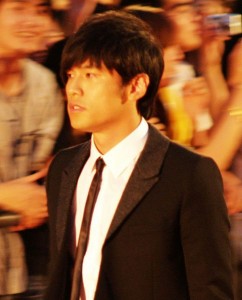 Chou at the 2007 Shanghai Film Festival
Chou at the 2007 Shanghai Film Festival
Chou acquired his first directing experience in 2004 through music videos. He initially experimented with a song by the group Nan Quan Mama titled “Home” (Chinese: 家; pinyin: jiā) where he was involved throughout the entire process from research to editing. After learning the difficulties of being a director, he refused to direct again even at the request of his record company. However, his interest resurfaced again as he directed music videos for 4 of the 12 songs in own album November’s Chopin in 2005, and later television advertisements. By 2006, he had taken responsibility for the storyboard, directing, and editing of music videos for all his songs. It is unclear how the public appraises his work, since music videos are rarely the subject of critical review; however, director Zhang Yimou said that Chou’s directing abilities may surpass his own in the future, after viewing several of Chou’s music videos.
In February 2007, Chou finally directed his first movie Secret. The story he wrote is based loosely on his relationship with a high school girlfriend, with a plot focused on music, love, and family. He stars as the lead actor of the film with Gwei Lun-Mei as the female lead, and Hong Kong veteran actor Anthony Wong as Chou’s father. Despite previous experience in filming music videos, Chou admits that movies are more challenging due to storyline and time constraints. This movie was released in July 2007.
In 2013, Jay Chou released his second directed movie release; movie-musical The Rooftop. This movie generated a more muted response compared to his directorial debut, however box office receipts in mainland China have been good.

